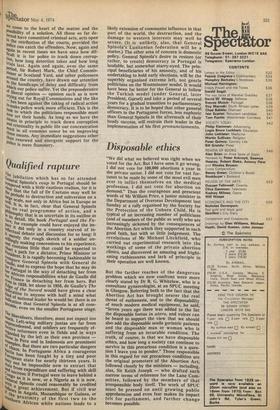Disposable ethics
"We did what we believed was right when we voted for the Act. But I have seen it go wrong. I did not vote for 100,000 abortions a year in the private sector. I did not vote for vast fortunes to be made by some of the most evil men ever to inflict themselves on the medical profession. I did not vote for abortion on demand." Thus the courageous and prescient words of Mr William Price, a junior minister in the Department of Overseas Development last Sunday at a rally organised by the Society for the Protection of the Unborn Child. He is typical of an increasing number of politicians (and of members of the public as well) who are increasingly sickened by the consequences of the Abortion Act which they supported in such good faith, but with so little judgement. The revelations of Mr Michael Litchfield, who carried out experimental research into the workings of some of the private abortion clinics, and discovered an amazing and frightening ruthlessness and lack of principle in their operation are well known.
But the farther reaches of the dangerous problem which we now confront were more clearly stated by Dr R. G. Whitelaw, who is a consultant gynaecologist, at an SPUC meeting in Glasgow. Referring both to the fact that the Abortion Act has brought nearer the real threat of euthanasia, and to the disposability of much modern medical equipment, he said, "Seven years ago there was added to the list the disposable foetus in utero, and voices can be heard to support the view that we should also add the disposable senile geriatric patients and the disposable man or woman who is suffering from an incurable condition. The truth, of course, is that we have disposable ethics, and how long a society can continue to survive in this precarious condition is a question I leave you to ponder." Those responsible in this regard for our precarious condition are the original promoters of the Abortion Act, followed closely by the ministers — including, alas, Sir Keith Joseph — who drafted such narrow terms of reference for the Lane Committee, followed by the members of that irresponsible body itself. The work of SPUC must be pressed on until growing public apprehension and even fear makes its impact felt for parliament, and further change becomes possible.


































 Previous page
Previous page